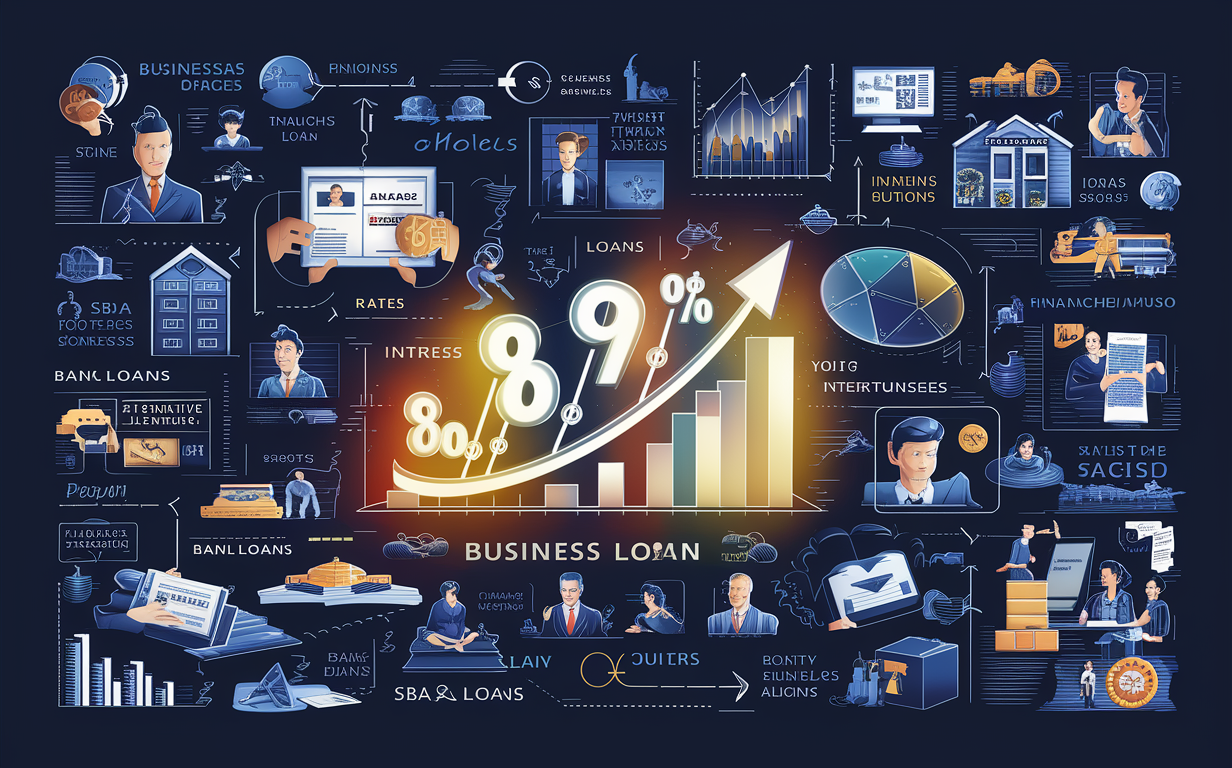
Interest rates for commercial loans are the fees lenders charge businesses for borrowing money. These rates matter because they impact the overall cost of financing for companies. Currently, interest rates for various commercial loans like SBA loans, bridge loans, and CMBS loans generally range from 4% to 12%. Understanding financing options and interest rates is crucial for business owners and investors seeking capital to grow, purchase property, or cover expenses. Getting a favorable interest rate can significantly impact profitability and cash flow. This guide explores different commercial loan types, factors affecting rates, strategies to secure the best terms, and trends in this complex lending landscape.
Understanding Commercial/ Business Loan Interest Rates

What are Commercial Loan Interest Rates?
Commercial loan interest rates refer to the cost of borrowing money for business purposes, such as purchasing real estate, equipment, or funding operations. These rates are typically higher than residential mortgage rates because lenders view business loans as riskier investments.
Factors Influencing Business Loan Interest Rates
Several factors influence the interest rates you’ll pay on a commercial loan. Your credit score and financial history play a significant role, as lenders want to ensure you can repay the debt. The loan term (how long you have to pay it back) and property type (e.g., office, retail, multifamily) also impact rates.
Market conditions and economic factors, like inflation and the overall interest rate environment, can also affect commercial loan rates. When the economy is strong, rates tend to be higher, and vice versa.
Fixed vs. Variable Interest Rates
Commercial loans can have either fixed or variable interest rates. A fixed rate stays the same throughout the loan term, providing stability and predictability in your payments. A variable rate, on the other hand, fluctuates based on market conditions.
Variable rates may start lower than fixed rates, but they can increase over time, making your payments less predictable. Businesses might choose a variable rate if they expect to pay off the loan quickly or if interest rates are expected to drop.
In summary, understanding commercial loan interest rates and the factors that influence them is crucial for businesses seeking financing. Carefully consider your options and work with a trusted lender to secure the best rates and terms for your needs.
Types of Commercial Loans and Their Interest Rates

SBA Loan Interest Rates
Small Business Administration (SBA) loans are a type of commercial loan designed to help small businesses access financing at favorable interest rates. The SBA doesn’t directly lend money. Instead, it partners with lenders like banks and credit unions to guarantee a portion of the loan, reducing the risk for the lender.
The most common SBA loans are the 7(a) and 504 programs. For the 7(a) loan, the maximum interest rate is currently capped at 8.25% for loans with maturities under 7 years and 9.25% for loans with maturities over 7 years. For the 504 loan, the current interest rate is around 5-6% for the portion funded by a Certified Development Company (CDC) and the bank’s portion is based on market rates.
SBA loans offer several benefits, including lower down payments, longer terms, and the ability to use the funds for a variety of purposes, such as working capital, equipment purchases, or real estate acquisitions.
Bridge Loan Interest Rates
A bridge loan is a short-term financing solution designed to help businesses or individuals bridge the gap between two longer-term financing solutions. In the context of commercial real estate, bridge loans are often used to quickly acquire a property before securing permanent financing.
Bridge loan interest rates are typically higher than traditional commercial loans, reflecting the increased risk for the lender. Currently, bridge loan interest rates range from 8% to 12%, depending on the lender, the property type, and the borrower’s creditworthiness.
While bridge loans can be a useful tool for quickly accessing cash, they also come with higher costs and shorter terms, typically ranging from 6 months to 3 years. As such, bridge loans are best suited for short-term financing needs and should be replaced with more permanent, lower-cost financing as soon as possible.
Factors Affecting Commercial & Business Loan Interest Rates

Understanding the Impact of Credit Score and Loan-to-Value Ratio
Your credit score plays a crucial role in determining the interest rate for a commercial loan. Lenders view borrowers with higher credit scores as less risky, resulting in lower interest rates. A strong credit history demonstrates your ability to manage debt responsibly, making you a more attractive candidate for favorable loan terms.
The loan-to-value (LTV) ratio is another significant factor. This ratio compares the loan amount to the value of the property being financed. A lower LTV ratio means you’re putting more money down, which reduces the lender’s risk and often translates to a lower interest rate. Conversely, a higher LTV ratio may lead to higher interest rates as the lender perceives more risk.
The Importance of Debt Service Coverage Ratio and Industry
The debt service coverage ratio (DSCR) is a measure of your business’s ability to cover its debt obligations with its current income. Lenders typically prefer a higher DSCR, as it indicates a stronger cash flow and a lower risk of default. A higher DSCR can result in more favorable interest rates.
The industry in which your business operates can also impact the interest rate. Some industries are perceived as riskier than others, which can lead to higher interest rates. For example, lenders may view businesses in the hospitality or retail sectors as riskier due to their sensitivity to economic conditions, potentially resulting in higher interest rates.
Loan Term and Amortization: Balancing Costs and Flexibility
The loan term, or the length of time over which you’ll repay the loan, can significantly impact the interest rate. Generally, shorter loan terms come with lower interest rates, as the lender’s risk is reduced over a shorter period. However, shorter terms also mean higher monthly payments, which may strain your business’s cash flow.
On the other hand, longer loan terms often have higher interest rates but lower monthly payments, providing more breathing room for your business’s cash flow. It’s essential to strike a balance between interest costs and monthly payment affordability.
The amortization schedule also plays a role in determining the interest rate. Amortization refers to the repayment schedule of both the principal and interest over the loan term. A longer amortization period can result in lower monthly payments but higher overall interest costs. Conversely, a shorter amortization period means higher monthly payments but lower total interest paid over the life of the loan.
By understanding these factors, you can better navigate the commercial loan process and secure the most favorable interest rate for your business’s financing needs.
Securing the Best Commercial Loan Interest Rates

Understanding Interest Rates
Interest rates are a crucial factor when obtaining a commercial loan for your business. They determine the cost of borrowing money and can significantly impact your overall financing costs. Lower interest rates mean lower monthly payments and reduced expenses over the life of the loan.
Shopping Around and Comparing Offers
To secure the best interest rates, it’s essential to shop around and compare offers from multiple lenders. Each lender has its own criteria for evaluating loan applications, and their interest rates can vary widely. By comparing rates from different banks, credit unions, and online lenders, you increase your chances of finding the most favorable terms.
Improving Credit Score and Providing Collateral
Your business credit score plays a crucial role in determining the interest rates you’ll be offered. Lenders view borrowers with higher credit scores as lower risks, and they may offer lower interest rates as a result. Improving your credit score by paying bills on time, reducing debt, and maintaining a healthy credit history can help you secure better rates.
Additionally, providing collateral, such as real estate or equipment, can also help you obtain lower interest rates. Lenders view secured loans as less risky, and they may be willing to offer more favorable terms.
Working with a Commercial Loan Broker
Benefits of Working with a Broker
Working with a commercial loan broker can be advantageous when seeking the best interest rates. Brokers have extensive knowledge of the commercial lending landscape and can help you navigate the complexities of the process. They have relationships with multiple lenders and can shop around on your behalf to find the most competitive rates and terms.
Finding a Reputable Broker
When choosing a commercial loan broker, it’s crucial to find a reputable and experienced professional. Look for brokers with a proven track record of securing favorable loan terms for their clients. You can research brokers online, read reviews, and ask for referrals from other business owners or professionals in your network.
By following these strategies and working with a knowledgeable commercial loan broker, you can increase your chances of securing the best interest rates and minimizing the overall cost of borrowing for your business.
Commercial Loan Interest Rate Trends and Predictions

Current Interest Rate Trends
In recent years, interest rates for commercial loans have been on a steady rise. This trend is largely driven by the Federal Reserve’s efforts to combat inflation by raising the federal funds rate. As the cost of borrowing increases, lenders adjust their interest rates accordingly, impacting the financing options available to businesses.
Future Interest Rate Predictions
Economists and financial experts closely monitor various economic factors to predict future interest rate movements. Key indicators include inflation rates, employment data, and economic growth projections. Based on these factors, many analysts anticipate interest rates to continue rising in the near future, although the pace of increases may slow down.
Importance for Business Owners and Investors
Staying informed about interest rate trends is crucial for business owners and investors. Higher interest rates can significantly impact the cost of borrowing, affecting cash flow, profitability, and overall investment decisions. By understanding the market conditions and potential interest rate changes, businesses can make informed decisions about financing options, loan terms, and risk management strategies.
Impact of Federal Reserve Decisions on Interest Rates

Federal Reserve’s Role
The Federal Reserve, the central banking system of the United States, plays a pivotal role in influencing interest rates. Through its monetary policy decisions, the Fed can adjust the federal funds rate, which is the interest rate at which banks lend to each other overnight.
Recent Federal Reserve Actions
In response to rising inflation, the Federal Reserve has been aggressively raising the federal funds rate since March 2022. These rate hikes have a ripple effect on various loan types, including commercial loans, mortgages, and credit card rates.
Preparing for Interest Rate Changes
To prepare for potential interest rate changes, businesses should consider the following strategies:
- Refinancing: Explore opportunities to refinance existing loans at more favorable interest rates.
- Fixed-rate loans: Consider securing fixed-rate loans to lock in current interest rates and avoid future rate fluctuations.
- Cash flow management: Review and optimize cash flow projections to accommodate potential increases in loan payments.
- Cost analysis: Evaluate the impact of higher interest rates on overall business costs and adjust pricing strategies accordingly.
By staying informed and proactively managing financing options, businesses can navigate the ever-changing interest rate landscape and make strategic decisions to support their long-term success.
Real-Life Examples and Case Studies

Securing Favorable Interest Rates for Business Loans
In today’s competitive market, securing a favorable interest rate for a business loan can make a significant difference in the success of your venture. Here are some real-life examples of businesses that navigated the lending process and secured commercial loans at advantageous rates.
The Thriving Bakery
Sarah’s Bakery, a beloved local establishment, needed additional financing to expand their operations and open a second location. With a strong credit history and a solid business plan, they approached various lenders and ultimately secured a commercial loan with a 5.5% interest rate. This favorable rate allowed them to invest in new equipment, hire additional staff, and successfully launch their second location without being overburdened by high interest payments.
The Innovative Tech Startup
TechVentures, a promising tech startup, had a brilliant idea but limited funding. They approached several investors and banks with their pitch and were able to secure a $2 million commercial loan at a 7% interest rate. This competitive rate enabled them to develop their product, hire a talented team, and bring their innovative solution to market without compromising their growth potential.
In both cases, factors such as a strong credit history, a well-crafted business plan, and a compelling value proposition played crucial roles in securing favorable interest rates. By navigating the lending process strategically and presenting a compelling case, these businesses were able to access the financing they needed to fuel their growth and achieve success.
The Impact of Favorable Business Loan Interest Rates
Securing a favorable business loan interest rate can have a profound impact on a business’s financial health and long-term success. Lower interest rates translate into lower loan repayment costs, freeing up cash flow for reinvestment in the business. This can enable businesses to expand their operations, invest in research and development, hire top talent, and stay ahead of the competition.
Moreover, favorable interest rates can significantly reduce the overall cost of borrowing, potentially saving businesses thousands or even millions of dollars over the life of the loan. This financial flexibility can be the difference between a struggling business and a thriving one, allowing entrepreneurs to focus on growth and innovation rather than being weighed down by crippling debt.
Finding the Right Commercial Loan for Your Business

Understanding Your Business Needs
Securing the right commercial loan is crucial for the success of your business. Before exploring financing options, it’s essential to assess your specific needs. Consider factors such as the purpose of the loan (e.g., purchasing equipment, expanding operations, or acquiring real estate), the amount required, and your ability to repay the loan based on your business’s cash flow and revenue projections.
Evaluating Loan Options
When evaluating commercial loan options, consider the following factors:
- Interest rates: Compare rates offered by different lenders to find the most competitive option. Keep in mind that rates can vary based on factors such as your credit history, the loan amount, and the loan term.
- Repayment terms: Understand the loan term (the length of time you have to repay the loan) and the amortization schedule (how the loan principal and interest are paid over time).
- Fees and charges: Be aware of any upfront fees, such as origination fees or closing costs, as well as ongoing fees like annual maintenance fees.
- Collateral requirements: Some lenders may require you to provide collateral, such as real estate or equipment, to secure the loan.
Working with Experienced Professionals
Navigating the world of commercial financing can be complex, especially for first-time borrowers. Consider working with experienced professionals, such as business loan brokers or financial advisors, who can guide you through the process and help you secure the best financing option for your business.
Additional Resources and Tools
To further your understanding of commercial loan interest rates and financing options, explore the following resources:
- Online calculators and comparison tools that allow you to input your specific loan requirements and compare rates from multiple lenders.
- Websites and guides from reputable sources, such as the Small Business Administration (SBA) or industry associations, that provide educational content and up-to-date information on commercial financing.
- Local business development centers or chambers of commerce, which may offer workshops or one-on-one counseling on financing options for small businesses.
Remember, securing the right commercial loan can be a game-changer for your business’s growth and success. Take the time to research and understand your options, and don’t hesitate to seek professional guidance when needed.
Securing the Best Financing for Your Commercial Ventures

As a business owner or investor, navigating the intricate world of commercial lending can be daunting. However, by understanding the nuances of commercial loan interest rates, you can make informed decisions and secure favorable financing terms. I encourage you to leverage the resources at uscommerciallending.com, where our team of experts is dedicated to guiding you through the complexities of the industry.
